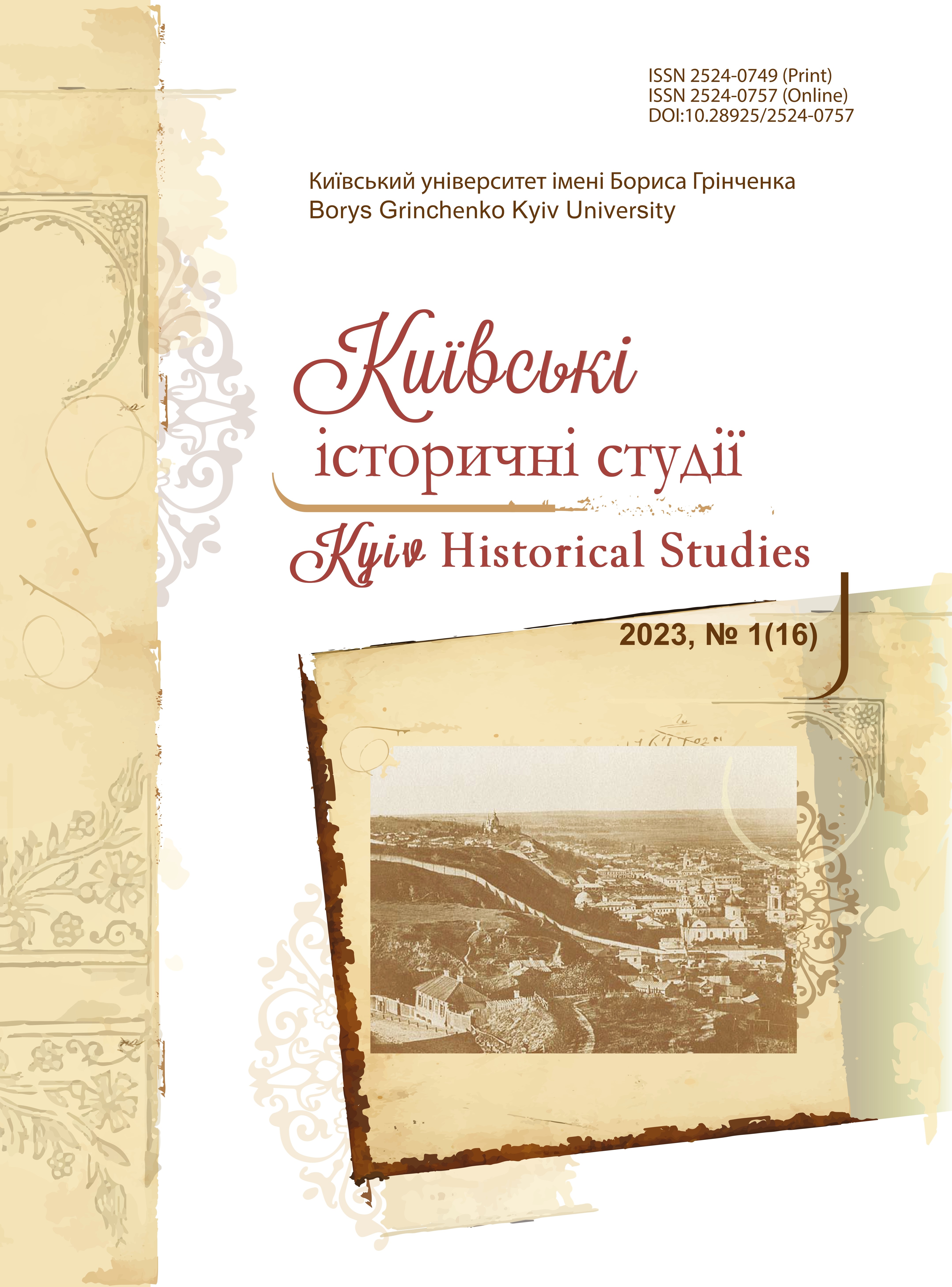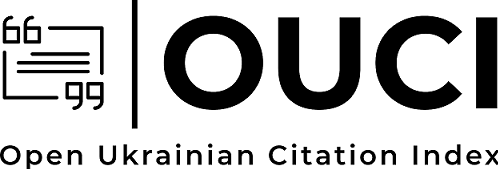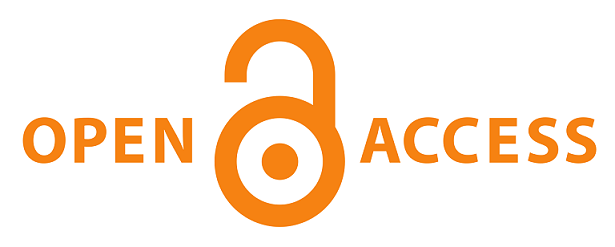Social and Political Conditions for Intellectual’s Literary-Art Activities in 1920s
DOI:
https://doi.org/10.28925/2524-0757.2023.19Keywords:
literary and artistic intellectuals, totalitarian regime, Mykola KhvyliovyiAbstract
This paper analyses the most important processes of Ukrainian culture development in early totalitarian period of 1920s. The fundamental approach for assessing this period was the fact that the formation of the totalitarian regime had the primary influence on the cultural in general and literary-art activities in particular and was transforming it in the way the regime saw the “cultural revolution”.
The 1920s were marked as the period of the soviet policy against intellectuals. Same concerns the policy of “ukrainisation”, despite it caused the acceleration of the Ukrainian culture development, in its essence has not created a freedom of development and was a controlled by bolsheviks’ party process of the regime adaptation to the reality of national republics. Thus the analysis of a change in approaches to intellectuals and their role in society, which was living through the heavy transformations of forced character, is important aspect of totalitarian USRR regime development.
The subject matter of this paper is the analysis of social and political conditions for the literary and artistic intellectuals in 1920s in motion and analysis of the connections with the political processes in USSR.
Mass social oppression and social engineering are the aspects specific for the soviet regime. The issue of literary-art activities are analysed in three aspects: intellectuals in soviet ideology; state politics innovations against literary and artistic intellectuals in 1920s; general soviet approaches to conquering and controlling the Ukrainian literature and art representatives in the USSR. We have identified that social and political conditions had significant differences with the Russia and USSR in general. This was due to the fact that the national character of intellectuals was creating a tension between the center and republics. We explored the fact that the soviet policy against literary and artistic intellectuals had a non-linear character and had the peculiarities different to the general political processes.
Downloads
References
Annenkov, Yu. (1991). Vladimir Lenin, People and Portraits. A Tragic Cycle, 2, pp. 253–283, Moscow, Khudozhestvennaia literatura [in Russian].
Baberovski, Y. (2007). Chervonyi teror. Istoriia stalinizmu. Kyiv: K.I.S, 248 p. [in Ukrainian].
Hundorova, T. (2000). Intelektualna dystopiia Yuriia Lutskoho. Lutskyi Yu. Literary Politics in the Soviet Ukraine. 1917 1934, pp. 9–16. Kyiv: «Helikon» [in Ukrainian].
Kantor, Yu. Z. (2013). «Na kazhdogo intelligenta dolzhno byt delo». Metodologiia borby s inakomisliem v pervyie gody sovetskoi vlasti. Istoriia stalinizma: zhizn v terrore, pp. 218–225, Moscow: ROSSPEN [in Russian].
Komarenko, T. O., & Shypovych, M. A. (1999). Vlada i literaturno-mystetska intelihentsiia radianskoi Ukrainy: 20 ti roky XX st., Kyiv: Instytut istorii Ukrainy [in Ukrainian].
Kulturne budivnytstvo v Ukrainskii RSR. Vazhlyvi rishennia Komunistychnoi partii i Radianskoho uriadu. 1917 1959 rr., zbirnyk dokumentiv, Vol. 1, (1917–cherven 1941 rr.), Kyiv [in Ukrainian].
Leites, O., & Yashek M. (1928). Desiat rokiv ukrainskoi literatury (1917–1927). Vol. 2, Orhanizatsiini ta ideolohichni shliakhy ukrainskoi radianskoi literatury, [Kharkiv]: Instytut Tarasa Shevchenka, Derzhvydav Ukrainy [in Ukrainian].
Lutskyi, Yu. (2000). Literaturna polityka v radianskii Ukraini 1917 1934. Kyiv: «Helikon» [in Ukrainian].
Babichenko, D. (comp.) (1997). «Schastie literatury». Gosudarstvo i pisateli. 1925 1938 gg. Dokumenty. Moscow [in Russian].
Velychenko, S. (2017). Imperializm i natsionalizm po chervonomu: ukrainska marksystska krytyka rosiiskoho komunistychnoho panuvannia v Ukraini (1918–1925). Lviv: Vydavnytstvo UKU [in Ukrainian].
Vysylka vmesto rastrela. Deportatsiia intelligentsii v dokumentakh VChK–GPU. 1921 1923. (2005). Moscow [in Russian].
Yakubova, L. a) (2021). «Natsionalna za formoiu, sotsialistychna za zmistom»: ukrainska kultura v labetakh bilshovytskoi ideolohii. Vyprobovuiuchy doliu, hartuiuchy voliu. Ukraina i ukraintsi v XX – na pochatku X st., Vol. 1, pp. 547–573, Kyiv: TOV «Сlio» [in Ukrainian].
Yakubova, L. b) (2021). Natsionalne pytannia: bilshovytski retsepty. Vyprobovuiuchy doliu, hartuiuchy voliu. Ukraina y ukraintsi v XX – na pochatku XX st., Vol. 1, pp. 500–546, Kyiv: TOV «Сlio» [in Ukrainian].
Yakubova, L., & Prymachenko, Ya. (2016). V obiimakh strakhu i smerti. Bilshovytskyi teror v Ukraini. Kharkiv: Klub simeinoho dozvillia [in Ukrainian].
Published
How to Cite
Issue
Section
License
Copyright (c) 2023 Олександр Бонь

This work is licensed under a Creative Commons Attribution-NonCommercial-ShareAlike 4.0 International License.
Authors who publish in this journal retain the right of authorship of the work and give to the journal right of first publication of this work under the conditions of Creative Commons: Attribution-NonCommercial-ShareAlike 4.0 International (CC BY-NC-SA 4.0), which allows others freely distribute the work published with reference to the authors of the original work and the first publication of this magazine.














